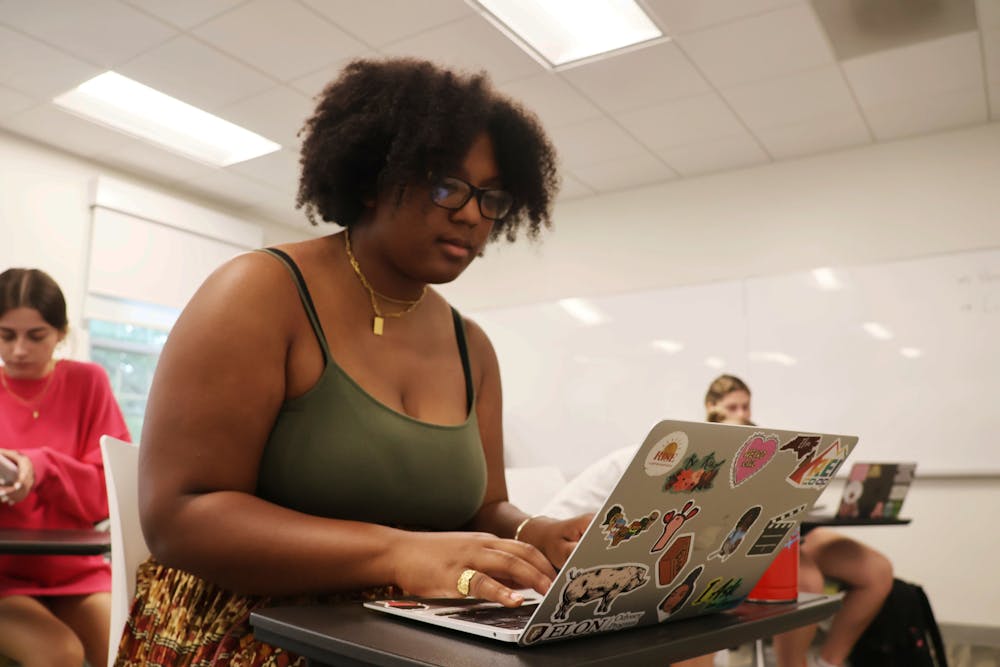Elon University classrooms will use Glean, a browser-based note taking application, as an additional accommodation resource for the 2023-24 academic year after a pilot program last year. Students with approved note taking accommodations through Disabilities Resources will have access to Glean.
Glean records the audio of the professor’s lecture and maintains notes in a centralized area for more efficient studying.
Associate Provost of Academic Affairs Jennifer Platania wrote in an email to Elon News Network that before Glean was introduced to Elon, students with note taking accommodations through Disabilities Resources were reliant on peer notetakers to record and share notes with those who needed them. Designated peer notetakers recorded notes during class and then uploaded them to an online portal. Peer note takers were allowed early access to class registration.
Junior Jayla Martin-Beasley is a peer notetaker who has volunteered for the past two years. Martin-Beasley said knows how much this position means to those who need it.
“They’re dependent on me to be able to get information,” Martin-Beasley said. “Because if there’s something that the professor says but doesn’t write down and they say, ‘Oh, it’s gonna be on the exam,’ then that sort of thing can affect them.”
According to Platania, Disabilities Resources have had difficulties recruiting volunteers to take notes during class and that the quality of notes would vary depending on the student writing them.
“I will say that taking notes can be difficult depending on the professor’s style,” Martin-Beasley said. “There will be things like I’m watching videos, class discussions, that can be hard to figure out in the moment what I can take down that captures the essence of what is being taught about.”
According to Platania, the difficulties of student note takers led staff in Disabilities Resources to look for alternative ways to meet the needs of students who require note taking accommodations.
“We decided that we needed to find a better way to offer note taking accommodations to our students registered with the Office of Disabilities Resources. Glean was an easy choice,” Platania wrote.
Glean was piloted during the 2022-23 academic year. Platania wrote that a survey sent by Disabilities Resources for the testing year showed positive results. According to Platania, students reported Glean was a helpful tool and used regularly during class.
Junior and peer notetaker Julia Clerici said Glean was a positive addition.
“I think, overall, great resource,” Clerici said. “It’s important to have these resources and that it keeps updating and becoming more accessible.”
Martin-Beasley said some students have found the app overwhelming or difficult to use.
“I’ve heard a lot of people talk about what do you do about accents, what do you do if people talk fast, talk slow, talk a little differently,” Martin-Beasley said. “Also there’s not a lot that people know about how it works, especially if you haven’t opted in.”
Despite the feedback, Platania wrote that Disabilities Resources is working to solve this issue. According to Platania, during the 2022-23 testing period, multiple training sessions were hosted to teach students how to use Glean, but not many people attended. As a result, Disabilities Resources used the past summer to consider how to integrate Glean to students at Elon.
“As part of the new training initiatives, the DR Office will offer one-on-one training sessions for each individual student,” Platania wrote.
Plantia wrote that Disabilities Resources hopes Glean will become a common resource in the future. Results from a downloadable survey from the Glean website show that 85% of students who use Glean find studying less stressful, 89% say they achieved better grades and 93% say that Glean improved how they learn.
“I’m hopeful we can bring these same kind of results to our students with disabilities at Elon,” Platania wrote.


